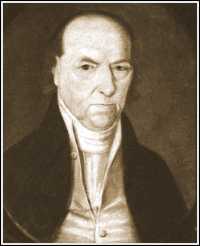FRtR > Biographies > John Blair
A Biography of John Blair 1732-1800
*** Quote ***
 Scion of a prominent Virginia family, Blair was born at Williamsburg in 1732. He was the son of
John Blair, a colonial official and nephew of James Blair, founder and first president of the
College of William and Mary. Signer Blair graduated from that institution and studied law at
London's Middle Temple. Thereafter, he practiced at Williamsburg. In the years 1766-70 he sat
in the Virginia House of Burgesses as the representative of William and Mary. From 1770 to 1775
he held the position of clerk of the colony's council.
Scion of a prominent Virginia family, Blair was born at Williamsburg in 1732. He was the son of
John Blair, a colonial official and nephew of James Blair, founder and first president of the
College of William and Mary. Signer Blair graduated from that institution and studied law at
London's Middle Temple. Thereafter, he practiced at Williamsburg. In the years 1766-70 he sat
in the Virginia House of Burgesses as the representative of William and Mary. From 1770 to 1775
he held the position of clerk of the colony's council.
An active patriot, Blair signed the Virginia Association of June 22, 1770, which pledged to
abandon importation of British goods until the Townshend Duties were repealed. He also
underwrote the Association of May 27, 1774, calling for a meeting of the colonies in a
Continental Congress and supporting the Bostonians. He took part in the Virginia constitutional
convention (1776), at which he sat on the committee that framed a declaration of rights as well as
the plan for a new government. He next served on the Privy Council (1776-78). In the latter year,
the legislature elected him as a judge of the General Court, and he soon took over the chief
justiceship. In 1780 he won election to Virginia's high chancery court, where his colleague was
George Wythe.
Blair attended the Constitutional Convention religiously but never spoke or served on a
committee. He usually sided with the position of the Virginia delegation. And, in the
commonwealth ratifying convention, Blair helped win backing for the new framework of
government.
In 1789 Washington named Blair as an associate justice of the U.S. Supreme Court, where he
helped decide many important cases. Resigning that post in 1796, he spent his remaining years in
Williamsburg. A widower, his wife (born Jean Balfour) having died in 1792, he lived quietly until
he succumbed in 1800. He was 68 years old. His tomb is in the graveyard of Bruton Parish
Church.
 Scion of a prominent Virginia family, Blair was born at Williamsburg in 1732. He was the son of
John Blair, a colonial official and nephew of James Blair, founder and first president of the
College of William and Mary. Signer Blair graduated from that institution and studied law at
London's Middle Temple. Thereafter, he practiced at Williamsburg. In the years 1766-70 he sat
in the Virginia House of Burgesses as the representative of William and Mary. From 1770 to 1775
he held the position of clerk of the colony's council.
Scion of a prominent Virginia family, Blair was born at Williamsburg in 1732. He was the son of
John Blair, a colonial official and nephew of James Blair, founder and first president of the
College of William and Mary. Signer Blair graduated from that institution and studied law at
London's Middle Temple. Thereafter, he practiced at Williamsburg. In the years 1766-70 he sat
in the Virginia House of Burgesses as the representative of William and Mary. From 1770 to 1775
he held the position of clerk of the colony's council.